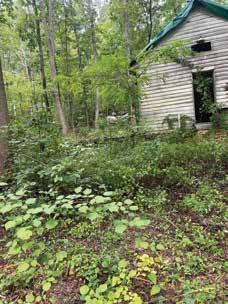
3 minute read
AAHA Finding Their Roots in Fauquier County
AAHA Finding Their Roots in Fauquier County
By Alissa Jones
A robust legacy of survival and triumph is documented within the walls of the Afro-American Historical Association of Fauquier County, located in The Plains.
While researching and weaving the tapestry of their own family histories, descendants of enslaved African Americans, Karen Hughes White and Karen King Lavore, founded the AAHA in 1992 out of a passion to help others connect with their own histories.

White and Lavore purposed to recognize and honor the more than 10,000 enslaved people in Fauquier County, from North and South America, as well as African and European Americans, who helped to shape the history of the country.
“Their family’s questions matter,” White said, “and our work is necessary because it is an important piece of the American story.”
White and businessman Mark Ohrstrom partnered to create the “Know Their Names” searchable database to properly memorialize the enslaved, who White said were treated like property, known only by their first names.
“We can never repay them for what they went through,” she added, “but at least we can be respectful and make their names known.”
The 4,269-square-foot museum of the AAHA contains 1,634 artifacts that tell the story of African American history in Fauquier County from Africa to Jamestown. It chronicles freedom from slavery and from England by following the thread through the Reconstruction and Jim Crow Eras, the Harlem Renaissance, the Civil Rights Era, and Blacks in the Military.
Family members can access records of family homes, churches, schools, and county courts through AAHA’s Genealogical Library. According to White, “we also keep networking with individuals and groups to expand our repository so others can use our resources.”
The AAHA database is already one of the biggest and most extensive in the nation, but White and Lavore say they still have work to do. “We are on a mission to make sure every enslaved person from Fauquier County is documented, leaving no one behind,” White said.
Additional databases and resources available include information on 1867 voters, born free and emancipated individuals, African American marriages, and mapping. The latter offers interactive web maps that delve into the history of enslaved people in Fauquier County, including details on landowners, historical sites, African American cemeteries, military service reports, and bible records.
Currently, the AAHA’s goal is to stabilize the Morgantown School House building and grounds near Marshall, make land improvements and repairs, and then replace the roof and bell tower.
Three generations of African American children passed through its halls, from the early 1890s until it closed in 1963. The school and property were gifted to the AAHA by Sheila Johnson, owner of Salamander Resort in Middleburg, in July of 2001 and it was placed on the historic places list in 2003.
The AAHA is a non-profit, supported by the community and sponsors educational programs for traditional schools and homeschooling programs. Annual events include: The commemoration of Martin Luther King Jr.’s birthday, Black History month, Juneteenth and Blacks in the Military.
Details: www.aahafauquier.org










